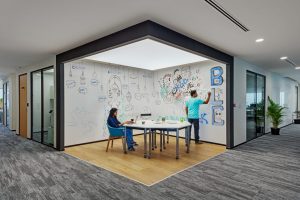
One of the most powerful and unique things about McKinsey is its culture. In this article, a former McKinsey consultant shares her key insights into what it’s like to work with McKinsey colleagues.
McKinsey colleagues are incredibly collaborative and go out of their way to help each other
Despite the competitive nature of the application process to get into McKinsey, the culture inside the Firm is the opposite. You genuinely feel that colleagues are there to support each other and collaborate rather than compete. This is supported by the fact that promotions are not limited in number, so if you meet the bar, you’re promoted, whether there are already enough people at the next level or not.
An example of collaboration you may find inside McKinsey is a large number of replies and calls that can come from sending an email to your office/practice list/cohort about a client-related challenge or question you have. People are always willing to help and often take pride in being the most helpful person!
There’s a real sense of people caring about each other. For example, decisions—such as which project you are staffed on—are often driven by what’s best for the individual and their development.
McKinsey has a very international one-firm community
The McKinsey culture is incredibly diverse and even though you may be part of one specific office, you have numerous opportunities to experience working alongside people from multiple countries. You can easily be working with a team of colleagues each with different nationalities.
In addition, training events are attended by people across the world, which means you often walk away with new colleague-friends in multiple countries. You will often have opportunities to work on international projects in the short-term, and there is the option to relocate as a long-term transfer to a new office. Knowledge and expertise is shared openly across borders, so you may find yourself calling an industry expert on a different continent to get a fresh perspective on your client’s industry.
If you love being among a melting pot of diverse nationalities then McKinsey is a fun place to learn from different people. Despite this diversity, it always astounded me how McKinsey colleagues from different countries still think, talk and communicate in similar ways. The McKinsey training and culture appears to transcend national borders and glue together a diverse range of people at the Firm.
McKinsey colleagues are always giving each other feedback
You may have heard about the feedback culture at McKinsey and it’s no joke.
The feedback model is one of the first things you learn at the Firm and feedback is used as a tool to help colleagues constantly improve their work and raise their bar. But it’s not all downward feedback from manager to consultant. Upward feedback, even from a junior Consultant to a Partner is expected and encouraged.
The minimum amount of feedback you can expect is a 20-minute chat with your manager every two weeks, but it’s also common to provide feedback to each other on an ongoing basis: after client meetings, on decks, and on your data modelling. The goal of the feedback is to help you learn and improve in the shortest time possible.
Excellence is in the McKinsey DNA
Given McKinsey’s enduring elite status in the consulting world, it’s no surprise that there are very high expectations put upon consultants.
The client always comes first at McKinsey and often teams will bend over backwards to get the results the client needs.
You are given a clear, comprehensive performance rating, based on feedback from all of the people you have worked with over the last six months. If your performance doesn’t meet the high bar you are encouraged to find an alternative route in your career.
That being said, the McKinsey culture is an incredibly unique combination of diversity, collaboration and excellence that has a lasting impact on its consultants.





